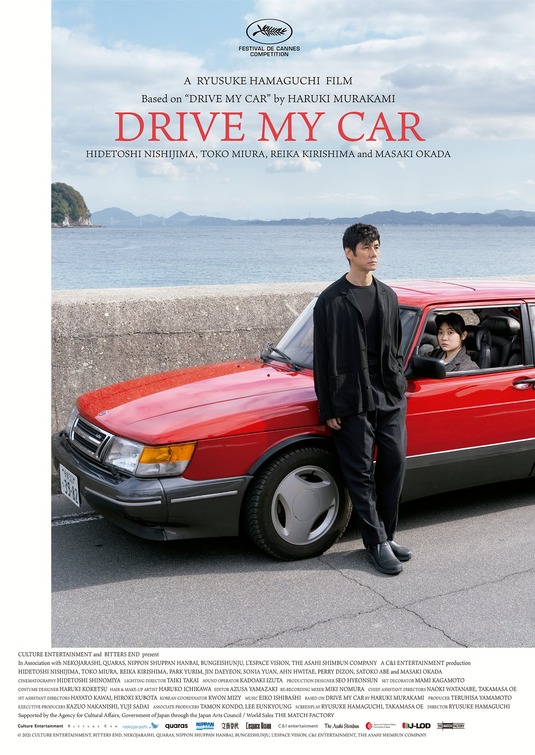
It’s a simple tale. A theater actor named Yūsuke Kafuku (Hidetoshi Nishijima) mourns the death of his wife, Oto Kafuku (Reika Kirishima). He’s directing a multi-lingual production of Chekhov’s Uncle Vanya in Hiroshima. The play features performers who speak Japanese, English, Korean, and even sign language. The international cast includes a hot-tempered star named Kôshi Takatsuki (Masaki Okada). The lothario was one of his late wife’s lovers. Meanwhile, Yusuke is assigned a personal driver, Misaki Watari (Tôko Miura). She is an expressionless young woman, cold and reserved. Misaki predictably warms up in conversations while driving Yūsuke around in his Saab 900.
This meandering contemplation isn’t about the plot. This is an account of the inner feelings of its main character. Drive My Car is based on Japanese writer Haruki Murakami’s atmospheric short story of the same name. It runs no more than 40 pages. So it’s telling that director Ryusuke Hamaguchi has taken that whisper of a narrative and expanded it into a patience-testing three-hour assemblage of chats. The opening credits appear 40 minutes into the movie after an extended prologue that is the superfluous background for the proper saga. The drama basks in a disquieting atmosphere of navel-gazing.
Murakami’s lugubrious meditation has critics universally heralding it as a profound exploration of grief, trauma, and Chekhov. This garnered 4 Oscar nominations including Best Picture, the first Japanese film ever to do so. Impressive, although expanding the pool to 10 nominees (for the first time since 2010) undoubtedly helped. Critiquing a film like Drive My Car is an exercise in futility. It’s kind of like reviewing an autostereogram. A major part of the op art’s appeal was the effort. The payoff is such an individual satisfaction. Whenever that 3-D shape would pop out from behind the colorful patterns, I would inevitably say “That’s it?” Such is director Ryusuke Hamaguchi’s tale. The allure lies in the joy of an expected result after staring at it. The difference is that this picture demands 3 hours of your time. I adore the filmmaking of “slow cinema.” Recent movies like Roma (2018) and First Cow (2019) were among my favorites of their years because the experience was so rewarding. This ambling rumination? Not so much. Sorry, but this doleful Saab story is not my Ford Tempo.
12-21-21

7 Responses
I knew that one day I would find someone who didn’t see the sheer brilliance of this movie..and lo and behold.. here we are! hahahahahahahahahaha
Hey I always keep it real. I’ve never been one to jump on the bandwagon. 😊
It’s not a bandwagon to be jumped on..it’s just a sheer brilliance and beauty of filmmaking bandwagon.. 🙂
To each their own. Cheers!
Cheers!
Three hours? I suppose I will have to see it sometime. Your review made me chuckle.
It’s currently in theatres but when it comes to streaming you can always pause and watch it over two sittings.